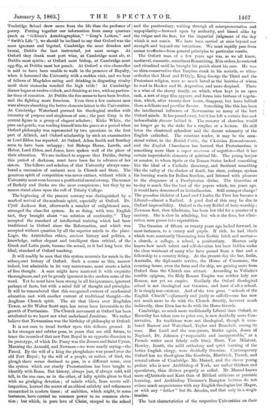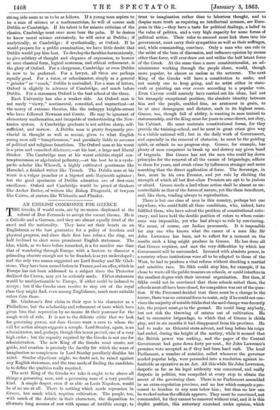Tunbridge School drew more from the life than the professor
of poetry. Putting together our information from many quarters (such as "Gibbon's Autobiographies," "Gray's Letters," and "Swift's Life "), we should be inclined to say that Oxford was the most ignorant and bigoted, Cambridge the most drunken and brutal, Dublin the best instructed, yet most savage. At Oxford they drank most port wine, at Cambridge most ale, at Dublin most spirits ; at Oxford most bishop, at Cambridge most egg-flip, at Dublin most hot punch. At Orford a vice-chancellor is said to have been unable to walk in the presence of Royalty, when it honoured the University with a sudden visit, and we hear of fellows of Magdalen eating and drinking in disgusting rivalry until their stomachs touched the high table ! At Cambridge dinner began at twelve o'clock, and drinking at two, with no particu- lar time of cessation. At Dublin the fun seems to have been livelier, and the fighting more ferocious. Even then a few eminent men were always absorbing the better elements latent in the Universities. At Cambridge Waterland pursued his theological studies with intensity of purpose and singleness of aim ; the poet Gray is the central figure in a group of elegant scholars ; Kirke White, the pure and gentle, was reading himself into his grave at a period when Oxford philosophy was represented by two questions in the first part of Aldrich, and Oxford scholarship by such an examination as Lord Eldon has reported. At Oxford, Adam Smith and Southey seem to have been unhappy ; but Bishops Horne, Lowth, and Heber, Lord Eldon, and Jones, have spoken well of the place of their education. We are inclined to suppose that Dublin, during this period of darkness, must have been far in advance of her sisters. The fellows and scholars of that University always num- bered a succession of eminent men in Church and State. The generous spirit of competition was never extinct, without which a University must soon become a pestilential moral swamp. The names of Berkely and Burke are the most conspicuous ; but they by no means stand alone upon the roll of Trinity College.
The beginning of the present century was distinguished by a marked revival of the academic spirit, especially at Oxford. Dr. Cyril Jackson first, afterwards a number of enlightened men, arranged the claas-list system. In so doing, with true English tact, they brought about "no solution of continuity." They accepted the standard of intellectual training which had been traditional in Oxford since the Reformation, and which was accepted without question by all the superior minds in the place. Logic, the Aristotelian ethics, ancient history and politics, a .knowledge, rather elegant and intelligent than critical, of the Greek and Latin poets, became the actual, as it had long been the ideal, standard of Oxford teaching.
It will readily be seen that this system accounts for much in the subsequent history of Oxford. Such a course as this, narrow indeed, but admirable in its very narrowness, must create a habit of free thought. A man might have mastered it with exquisite thoroughness, and yet be grossly ignorant in the modern sense of the -word. Yet he must have been strong in all his ignorance, ignorant perhaps of facts, but with a mind full of thought and principles. It will be remembered that this recognized current of academical education met with another current of traditional thought—the Anglican Church spirit. The air that blows over Magdalen Tower, as Sir Walter Scott says, has never been favourable to the growth of Puritanism. The Church movement at Oxford has been attributed to we know not what underhand Jesuitism. We rather believe that Newmanism was the birthday of philosophy at Oxford.
It is not ours to tread further upon this delicate ground. It is for stronger and subtler pens, in years that are still future, to trace the records of that new Port Royal in an opposite direction to its prototype, of which Dr. Pu.sey was the Jansen and Saint Cyran, Manning the Arnauld, and Newman—we were nearly saying—the Pascal. By the will of a king the ploughshare was passed over the old Port Royal ; by the will of a people, or rather, of God, the plough share seems destined to pass, in a different sense, over the system which our sturdy Protestantism has been taught to identify with Rome. But history, always just, if always cold, will tell, in the one case, as in the other, of lofty apirits given to God with no grudging devotion ; of minds which, from severe self. inspection, learned the secret of an ethical subtlety and refinement unmatched in modern times ; of ambition, which might, in some instances, have carried no common power to no common eleva- tion; but which, in pure love of Christ, stooped to the school
and the penitentiary, waiting through all misrepresentation and unpopularity—frowned upon by authority, and hissed alike by the vulgar and the free, for the impartial judgment of the day which is not man's. We have been carried at once beyond our strength and beyond our intentions. We must rapidly pass from causes to effects—from general principles to particular results.
The Oxford man of a few years ago was, as we all know, medimval, romantic, sometimes Romanizing. If in orders, he restored and ritualized until he brought his parish about his ears. He was so ultra-conservative that Toryism stank in his nostrils, so ultra- orthodox that Mast and D'Oyly, King George the Third and the Protestant religion, were as much hated as the heretics of whom he read in Hooker and St. Augustine, and more despised. There is a wine of the sherry family, on which, when kept in an open cask, a sort of ropy film appears, and forms into buttons of vegeta- tion, which, after twenty-four hours, disappear, but leave behind them a delicate and peculiar flavour. Something like this has been the intellectual influence of Newmanism on many of the best Oxford minds. It has passed away, but it has left a certain fine and indescribable flavour behind it. The restorer of churches would no longer go to the stake for a surplice or a lectern. He still loves the chastened splendour and the decent solemnity of the English cathedral. The constant reader, it may be the occa- sional writer, in the British Critic, the Christian Remembrancer, and the English Churchman has learned that Protestantism is something more than a caput mortuum of negation—that it has certain imperishable elements of spiritual life. The young lawyer or senator, to whom Spain or the Roman States looked something like the ideal of a Catholic theocracy, and Scotland something like the valley of the shadow of death, has since, perhaps, spoken his burning words for Italian freedom, and listened with pleasure to the eloquence of a Presbyterian divine. The Guardian of to-day is much like the best of the papers which, ten years ago, it would have denounced as latitudinarian. Still stranger change! The quondam idolater of Laud and Charles the First has become a Liberal—almost a Radical. A good deal of this may be due to Oxford impressibility. Oxford is the very Bethel of hero-worship ; Newman first, then Gladstone, has been her idol for a quarter of a century. She is slow in admiring, but when she does, her admi- ration soon passes into superstition.
The Oxonian of fifteen or twenty years ago looked forward, in most instances, to a curacy and pupils. If rich, he had, ideals which were constantly blossoming into Gothic brick and mortar— a church, a college, a school, a penitentiary. Heaven only knows how much talent and self-devotion has been hidden under the close waistcoat of many who have passed from a first and a fellowship to a country living. At the present day the bar, India, Australia, the diplomatic service, the House of Commons, the counting-house, even the farm and the ship, are gaining more from Oxford than the Church can attract. According to Voltaire's terrible epigram, the Holy Roman Empire was neither holy nor Roman, nor yet an empire. Similarly the Oxford theological school is not theological nor Oxonian, and least of all a school. It is simply non-existent. And of the two great "schools of the English Church"—(formerly and justly so called)—one has now not much more to do with the Church directly, however much indirectly, than Eton has to do with the Horse Guards.
Cambridge, so much more traditionally Liberal than Oxford, as Macaulay has taken care to point out, is now decidedly more Con- servative. Its traditions were not theological, though it num- bered Barrow and Waterland, Taylor and Bramhall, among its sons. But Laud and the non-jurors, Butler again, Jones of Nayland, Dr. Johnson ("respectable and insupportable," as a French writer most falsely calls him), Mant, Van Milatent, Howley, Routh, the mild orthodoxy and quiet learning of the better English clergy, were decidedly Oxonian. Contemporary Oxford has no theologians like Goodwin, Hardwick, Trench, and several others of Cambridge. Mr. Mansel, and the clever young prelate who is now Archbishop of York, are rather thinkers and speculators, than divines properly so called. Mr. Memel knows more ofLAristotle and Kant than of Biblical criticism or patristic learning, and Archbishop Thomson's Bampton lectures do not evince much acquaintance with any English theologian but Magee, or with any " father " but St. Anselm, and that only in a single treatise.
The best characteristics of the respective Universities on their
strong side seem to us to be as follows. If a young man aspires to be a man of science or a mathematician, he will of course seek Dublin or Cambridge. If his talent is for minute criticism of the classics, Cambridge must once more bear the palm. If he desires to know moral science extensively, he will enter at Dublin ; if analytically, at Cambridge ; if synthetically, at Oxford. If he would prepare for a public examination, we have little doubt that Dublin would pay him best. To develop the faculties harmoniously, to give subtlety of thought and elegance of expression, to bestow at once classical form, logical acuteness, and ethical refinement, is the glory of Oxford. For a clergyman, Cambridge or even Dublin is now to be preferred. For a lawyer, all three are perhaps equally good. For a tutor, or schoolmaster, simply as a general " grinder " or "coach," Dublin is unrivalled. For a man of letters, Oxford is slightly in advance of Cambridge, and much before Dublin. For a statesman Oxford is the best school of the three.
Each University has also a weaker side. An Oxford man is not rarely "viewy," sentimental, conceited, and unpractical—at the mercy of extreme theories, like the unhappy knights-errant who have followed Newman and Comte. He may be ignorant of elementary mathematics, and incapable of understanding the New-. tonian system. A Cambridge graduate is not seldom sharp, self- sufficient, and narrow. A Dublin man is pretty frequently pro- vincial in thought as well as accent, given to what English young men call "bumptiousness," and peculiarly liable to accesses of political and religious fanaticism. The Oxford man at his worst is a prim and conceited dilettante,—at his best, a large and liberal thinker. The Cambridge man at his worst exhibits stupid con- temptuousness or algebraical pedantry,—at his best he is a cyclo- predic scholar like Whewell, a highly cultivated gentleman like Herschel, a finished writer like Trench. The Dublin man at his wont is a vulgar preacher or a bigoted anti-Maynooth agitator ; but the good specimens of Dublin education are of first-rate excellence. Oxford and Cambridge would be proud of thinkers like Archer Butler, of writers like Bishop Fitzgerald, of lawyers like Cairns, of orators like Whiteside and Plunket.





























































 Previous page
Previous page